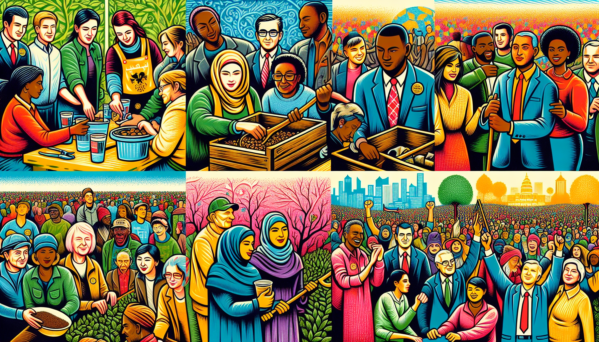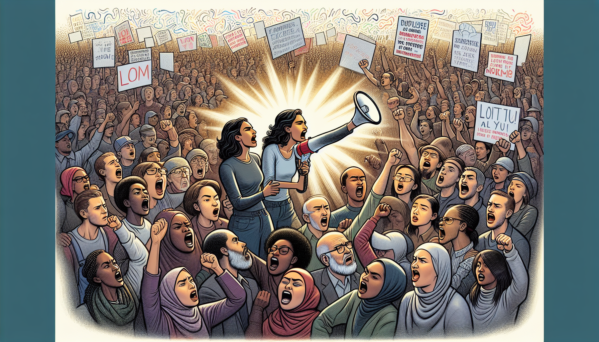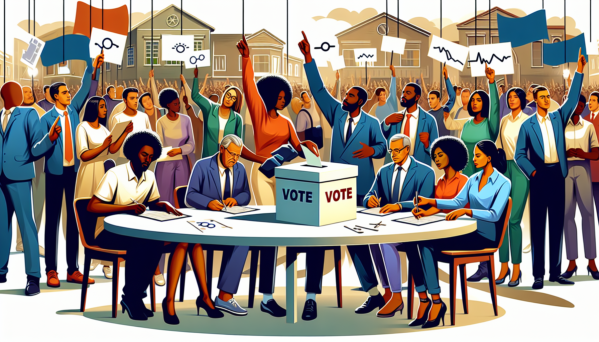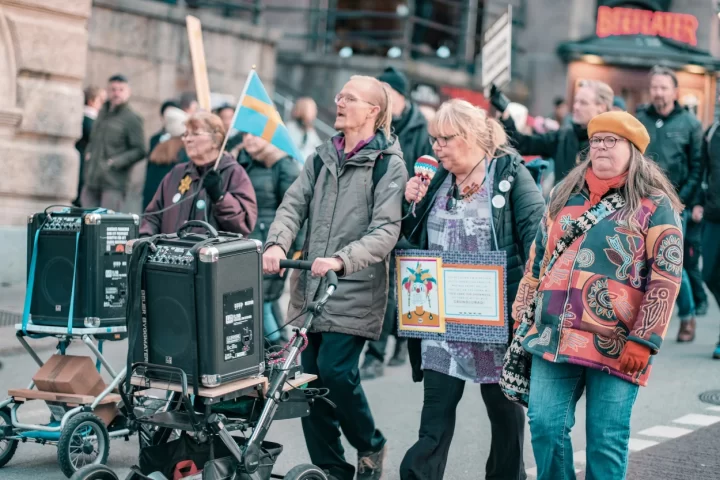Civic engagement is what keeps democracy strong and communities thriving. If you’re curious about how to get involved, this guide will show you simple ways to make a real impact. It explains how everyday actions can create positive change, helping you connect with others and make your voice count. Dive in and discover how you can make a difference in your community.
Key Takeaways
- Civic Engagement Strengthens Democracy
By actively participating in civic activities like voting, volunteering, and advocacy, individuals help shape government policies and ensure that their voices are heard. Engaged citizens make governments more representative and accountable. - Participation Builds Stronger Communities
Civic engagement fosters connections within communities by encouraging people to work together toward common goals. Whether through local events, neighborhood associations, or public discussions, these efforts lead to improved quality of life and a greater sense of belonging. - Modern Civic Engagement Includes Digital Tools
With the rise of online platforms and social media, civic engagement has expanded. Digital tools make it easier for people to get involved, from signing online petitions to participating in virtual town halls. These new avenues of participation are reshaping how people influence government and social change.
Table of Contents
What is Civic Engagement?

Civic engagement is about taking action to improve your community and participating in the processes that keep society running. It’s about getting involved, whether by voting in elections, volunteering, or advocating for change. Civic engagement helps build a strong, healthy society where individuals feel empowered to make a difference.
In a nutshell, civic engagement means playing an active role in your community. This participation strengthens democracy by ensuring that diverse voices are heard, and it also benefits individuals by building a sense of responsibility and belonging. You’re not just helping others; you’re helping yourself by shaping the world you live in.
Defining Community Engagement
Community engagement is a specific type of civic engagement. It focuses on directly improving the local community. This could mean organizing a neighborhood clean-up, mentoring local students, or attending town hall meetings. Community engagement is about working together for the common good.

In practical terms, community engagement includes everything from volunteering at a local shelter to starting a community garden. It’s about stepping up and working with others to improve your environment, whether through small acts of kindness or more formal roles like community organizing. No matter how small, each effort contributes to a stronger, more connected community.
Why Civic Engagement is Important

Civic engagement is vital for the health of democracy. When citizens are actively involved, they help shape policies that affect their daily lives. Participating ensures that governments and institutions stay responsive to the needs of the people. Without civic engagement, democracy would falter, as the gap between those in power and everyday people widens.
On a personal level, civic engagement boosts self-confidence and offers a sense of purpose. By volunteering, voting, or participating in discussions, people realize that they have the power to make a real difference. This empowerment leads to a more cohesive society, as people come together to solve problems and create lasting change.
Types of Civic Participation
There are many ways to engage civically, and each plays a crucial role in building a better community. Here are the four main categories of civic engagement:
- Political Participation: Voting in local, state, and national elections, running for office, or participating in political campaigns.
- Volunteering: Donating time to causes like helping the homeless, supporting local schools, or environmental projects.
- Advocacy: Pushing for change on social, political, or environmental issues by speaking out, organizing, or joining movements.
- Public Service: Serving in local government or taking on leadership roles in community organizations.
Each of these types of engagement provides opportunities to make a meaningful impact and ensure that the community reflects the needs of its members.

Examples of Civic Engagement
Civic engagement can take many forms, from simple acts to larger commitments. Voting is one of the most powerful ways to engage, but there are plenty of other activities that make a big difference. Here are a few examples:
- Neighborhood Watch: Keeping an eye on your community and helping prevent crime.
- Mentorship: Guiding young people in their career or personal development.
- Public Commenting: Sharing your views on proposed laws or policies at a public meeting.
- Organizing Fundraisers: Supporting local causes by raising money for schools, shelters, or other needs.
These actions help strengthen the fabric of your community and ensure that everyone’s voice is heard.
The Foundations of Civic Engagement
Effective civic engagement is built on certain foundational elements, including awareness, empathy, and collaboration. Awareness means staying informed about local and national issues that affect your community. Empathy involves understanding the needs and experiences of others, while collaboration is about working together to solve problems.
These elements are essential for creating meaningful change. When people are aware, empathetic, and willing to collaborate, civic engagement leads to stronger communities and a healthier democracy. Without these foundational elements, efforts to engage can fall flat, making it harder to achieve lasting results.
The Categories of Civic Engagement
Civic engagement can be broken down into four categories: direct service, community organizing, advocacy, and social entrepreneurship.
- Direct Service: Volunteering to meet the immediate needs of your community, such as helping at a food bank or tutoring students.
- Community Organizing: Bringing people together to tackle shared concerns, such as improving local parks or ensuring safer neighborhoods.
- Advocacy: Speaking up for policy changes or reforms, such as advocating for cleaner air or better healthcare.
- Social Entrepreneurship: Creating businesses or initiatives that directly address social problems, such as launching a nonprofit to provide job training.
These categories provide a framework for understanding how you can get involved and make a meaningful difference in your community.
Civic Commitment and Participation
Civic commitment means dedicating time and energy to improving society. It’s about being consistent in your efforts, whether that’s voting in every election, attending public meetings, or regularly volunteering. This commitment doesn’t require grand gestures; it’s about showing up and staying engaged over time.
Participation is key because it amplifies your voice. The more people who participate, the more powerful civic engagement becomes. When everyone contributes their ideas and energy, the community thrives, and democracy becomes stronger.
Why Your Engagement Matters
The importance of civic engagement can’t be overstated. By participating in your community, you help ensure that your voice—and the voices of others—are heard. You become part of the solution, working toward a better future for everyone.
Your engagement builds a sense of belonging, strengthens democracy, and improves the quality of life for everyone around you. Whether you’re voting, volunteering, or advocating for change, every action matters. Civic engagement is the backbone of a healthy, functioning society, and it starts with you.
Data on Civic Engagement Trends
Understanding how people participate in civic engagement helps illustrate its impact. Recent data shows significant trends in areas like voting, volunteering, and community involvement, offering insight into where civic engagement is thriving and where it may be lagging.
For example, the U.S. Census Bureau reported that voter turnout in the 2020 presidential election was one of the highest in history, with nearly 67% of eligible voters casting their ballots. This surge was particularly noticeable among younger voters, indicating a growing awareness and willingness to participate in shaping the future of the country.

On the other hand, volunteering statistics reveal a slight decline in recent years. According to a 2022 report by AmeriCorps, about 23% of Americans engaged in volunteer activities in the previous year, marking a decrease likely influenced by the COVID-19 pandemic. Despite this drop, civic participation in non-traditional forms, such as digital activism, has been rising, suggesting that the ways people engage are evolving.
These statistics highlight the dynamic nature of civic engagement, showing how participation fluctuates based on current events, social issues, and even global health crises. Keeping track of these trends is essential for understanding the overall health of a democratic society.
Unique Ways to Engage Locally
Getting involved in your local community is one of the most direct and impactful ways to practice civic engagement. While voting and large-scale advocacy are essential, many changes start small—right in your neighborhood.
One way to get started is by attending city council meetings. These meetings are often open to the public and offer an opportunity to discuss local issues, like zoning laws or public safety, directly with elected officials. It’s a chance to voice your opinion and influence decisions that affect your daily life.
Neighborhood associations
Are another excellent way to engage. These groups focus on local projects, such as improving parks, organizing block parties, or addressing safety concerns. They are a great way to meet neighbors and work together to improve the community.
For those who enjoy hands-on involvement, local volunteering is always in demand. Whether it’s helping out at a food bank, participating in a park clean-up, or mentoring students, these activities have a tangible impact on the well-being of the community.
Engaging locally doesn’t have to be a big commitment. Small actions, like supporting local businesses or attending a community event, help strengthen the social fabric. These connections not only improve the community but also deepen your sense of belonging.
When All Is Said And Done
Civic engagement is essential for building stronger communities and a healthier democracy. By taking small, meaningful actions, you can have a big impact on the world around you. Whether it’s through volunteering, voting, or speaking up for change, every effort counts. Get involved, stay connected, and make your voice heard—you have the power to make a difference.
Yes, the way people get involved in civic activities affects how well the government represents and responds to them. When more people vote or participate in public meetings, the government is more likely to reflect their needs and concerns.
Active citizens also help keep the government honest and accountable. If more diverse groups take part, the government can make fairer policies that include everyone. With the rise of online tools like social media, people can now engage more easily, showing how civic participation is changing. In the end, the government is better when more people take part in the process.
FAQs on Civic Engagement
- 1. What is the difference between civic engagement and community service?
Civic engagement is a broader concept that includes community service but also covers activities like voting, advocating for policy change, or participating in local government. Community service focuses on direct volunteer work, such as helping at a food bank or cleaning up public spaces. - 2. How does civic engagement affect youth development?
Civic engagement helps young people develop leadership skills, a sense of responsibility, and a connection to their community. It encourages critical thinking, problem-solving, and collaboration, all of which are important for personal and career growth. - 3. Can civic engagement be done online?
Yes! Online civic engagement includes activities like signing petitions, participating in virtual town halls, or using social media to advocate for causes. Digital tools make it easier to engage with your community and government from anywhere. - 4. What are some barriers to civic engagement?
Barriers to civic engagement can include lack of time, awareness, or resources, as well as distrust in political systems. Some people may also feel disconnected from their community or unsure about how to get involved. - 5. How can schools promote civic engagement?
Schools can promote civic engagement by teaching students about government and citizenship, encouraging participation in service-learning projects, and creating opportunities for students to volunteer or participate in local government events.
References:
- AmeriCorps – Civic Engagement through National Service
https://americorps.gov - Youth.gov – Civic Engagement Overview
https://youth.gov/youth-topics/civic-engagement - National Civic League – Why Civic Engagement Matters
https://www.nationalcivicleague.org - Center for Civic Education – The Importance of Civic Education
https://www.civiced.org
